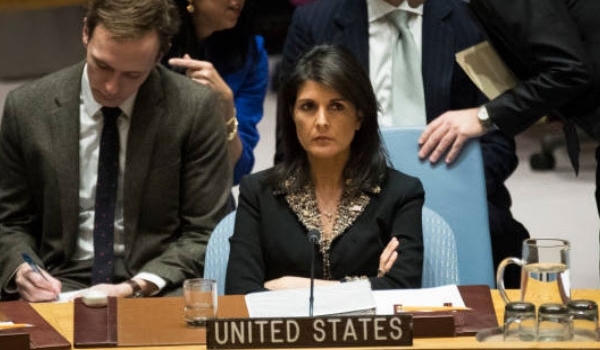
RNA - After all, Rouhani’s administration is comparatively liberal compared to the previous government. It is already gearing up to increase business across Eurasia through China’s new Silk Roads, the Belt and Road Initiative, and the Eurasia Economic Union.
So, what we have here is a concerted attempt by the United States, Saudi Arabia, Israel and their domestic-foreign elements to turn legitimate protests into a “revolutionary” movement with the aim of bringing about a regime change. In all practical purposes, it will simply not work. Anyone familiar with Iran knows the country’s civil society is far too sophisticated to fall into such a crude and obvious trap:
A) On Friday, January 5, millions of Iranian people took to the streets across the country, including the capital Tehran, for the third consecutive day, to show their solidarity with the Islamic Republic and condemn the recent scattered riots in four towns in the country.
B) On the same day, US Ambassador Nikki Haley managed to push for a meeting of the top UN body, Security Council, arguing the unrest could escalate into full-blown conflict and drawing a comparison with Syria. Russia opposed the US push for the Council to take any action against Iran, arguing the protests pose no threat to international peace and security.
C) Another argument was that if the US view holds, the Security Council should have also discussed the 2014 unrest in Ferguson, Missouri over the police shooting of a black teenager or the US crackdown on the Occupy Wall Street and anti-war movements.
D) China also described the Council meeting as meddling in Iran’s affairs, while other members expressed reservations about the discussion. Britain and France reiterated that Iran must respect the rights of protesters, but French Ambassador Francois Delattre said the “events of the past days do not constitute a threat to peace and international security.”
E) What is certain is that foreign powers and elements are acting as provocateurs to influence the anti-government riots. This “whole world is watching” tone by the US is meant to intimidate Tehran’s response. Yet there has to be a crackdown against the violence just as it happens in other parts of the world. Just imagine the police response if the level of violence seen on Iranian streets was happening in Paris, London, or Washington.
F) Regime change is unlikely but what is in play is setting the scene for a further renewal of economic sanctions by the Trump White House against Iran. Hopefully, the EU will not fall into this trap. The Trumpsters say the US has “ample authority” to hold Iranian officials accountable for any attempts to censor or commit violence against the protesters, saying that the demonstrators “will not be forgotten.” The question is what about America’s own violence and crackdown against its own anti-government protesters and people of color?
G) There are always similar protests in the US and Europe against government austerity measures, economic hardships, racism, discrimination and wars. When there is a government crackdown somewhere there, no one at the UN Security Council even bothers to go after the loud endorsement of Western protesters, or use human rights violations as a convenient opportunity to pick a fight with their governments - something Trump has openly advocated against Iran for awhile.
Which brings us to the conclusion that the threat to hold Iran “accountable” seems to be a way for the US to shoehorn a threat of direct intervention against Iran into the UN narrative, and is in keeping with Trump’s past promise to do something at the “appropriate time.” Even if Trump’s threats inevitably invites comparison with his own troubles with anti-establishment protesters in the US, he stands to gain if the US-backed violence divides the Iranian nation and upsets the uneasy alliance of long-time political rivals (reformers and conservatives) brought together in opposition to Washington’s continued threats and meddling in Iranian affairs.
847/940